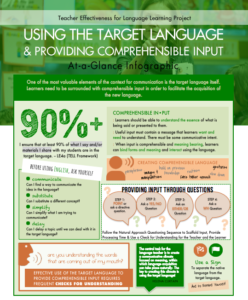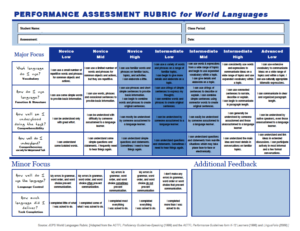“Should old acquaintances be forgotten, And never brought to mind?” … it only takes this song and a couple of hours of reflection on the just-completed calendar year and our list of resolutions or goals for the new year is longer than the grocery list for Christmas dinner. Of course, it’s easy to set goals and in our profession getting that winter break is like starting the school year all over again. We get to reset what happened in the fall. We get a second chance. And this time we’re gonna get it right and here are all the goals that are going to help us make that happen. Slow down for just a second … What if the idea of setting goals is the last thing you should be focusing on this time of year?
Forget About Setting Goals. Focus on This Instead.
Take a moment to read this insightful post shared with me by a good friend: Forget About Setting Goals. Focus on This Instead.
…
Did you click on the link and read the post? No. It’s ok. Here are the main points James Clear is trying to make and that resonated with me from the world language educator perspective.
1. Goals reduce your current happiness. How often have you been given goals by a school administrator without much support to actually meeting the goal? How often have you set unreasonable goals for yourself and then held yourselves accountable? How often did you beat yourselves up when you didn’t meet the goal? When we are setting goals, we put unnecessary stress on ourselves. James solution: Commit to a process, not a goal.
2. Goals are strangely at odds with long-term progress. As a runner, this one made a lot of sense to me. I used to train for half and full marathons using the race as the big goal line. Of course, as soon as the race was over, I stopped running until I found the next goal/race. How often do we set arbitrary goals and target dates (think state assessments) and as soon as we have completed them we fall back into our old habits? James solution: Release the need for immediate results.
3. Goals suggest that you can control things that you have no control over. This is a tough one for so many teachers as our current culture puts teachers in control in a room with a finite number of students for a finite number of minutes and it is easy to think that every one of our actions will trigger the right response. We can’t forget all the factors that every person in that room brings with them that we cannot control but somehow impact the learning experiences. Think home life issues, poverty issues, technology issues, private issues, … It’s easy to feel like a failure when we aren’t meeting our goals fast enough … or ever, and yet we have so little control over the factors that impact learning more than the much-belabored lesson plan. James solution: Build feedback loops.
Clearly, goals aren’t all as great as we thought and just reading over those three main points reminds me of many of the feelings teachers share with me all the time. Teaching is hard! Having goals, either given or identified by choice, can make it an almost impossible to enjoy our profession. Let’s take some of those ideas and apply them to traditional world language teacher goals in order to find solutions that might actually help you during 2017!
Goal Focus: Using the Target Language 90% of the Time
 For some time now our field is trying to figure out how to use more of the target language more of the time. It certainly was one of my goals earlier in my career. In fact, I wasn’t even just trying for 90%, I was going for 100%. It was a goal of mine for eight (8!!!) straight semesters. And I failed because instead of focusing on the systems I needed to establish, I focused on the goal. Even the ACTFL’s Position Statement from 2010 is being misinterpreted in support of goals instead of systems. Sure 90% is great. 90% would be amazing! However, it really isn’t about that somewhat arbitrary goal. What is much more important, are the systems that you will put into place this semester that will help you and your students to use the target language more. ACTFL’s position statement includes some important and yet often-overlooked systems-focused ideas. So, instead of counting up the minutes and being disappointed when you aren’t hitting your goal, think about what systems you could put into place that will allow you to 1) provide comprehensible input that is directed toward communicative goals, 2) make meaning clear through body language, gestures, and visual support, 3) conduct comprehension checks to ensure understanding, 4) negotiate meaning with students and encourage negotiation among students, 5) encourage self-expression and spontaneous use of language; 6) teach students strategies for requesting clarification and assistance when faced with comprehension difficulties. And, no, don’t try to do all of those things at once either. Pick one and begin to establish your systems for increased target language use. If you do that, you will hit your goal eventually. Just to get you started, watch this quick video that demonstrates what it could look like when some of those systems are in place and check out some of these resources. Solution: Focus on the systems and processes that you can put into place that will enable you and empower your students to use more target language.
For some time now our field is trying to figure out how to use more of the target language more of the time. It certainly was one of my goals earlier in my career. In fact, I wasn’t even just trying for 90%, I was going for 100%. It was a goal of mine for eight (8!!!) straight semesters. And I failed because instead of focusing on the systems I needed to establish, I focused on the goal. Even the ACTFL’s Position Statement from 2010 is being misinterpreted in support of goals instead of systems. Sure 90% is great. 90% would be amazing! However, it really isn’t about that somewhat arbitrary goal. What is much more important, are the systems that you will put into place this semester that will help you and your students to use the target language more. ACTFL’s position statement includes some important and yet often-overlooked systems-focused ideas. So, instead of counting up the minutes and being disappointed when you aren’t hitting your goal, think about what systems you could put into place that will allow you to 1) provide comprehensible input that is directed toward communicative goals, 2) make meaning clear through body language, gestures, and visual support, 3) conduct comprehension checks to ensure understanding, 4) negotiate meaning with students and encourage negotiation among students, 5) encourage self-expression and spontaneous use of language; 6) teach students strategies for requesting clarification and assistance when faced with comprehension difficulties. And, no, don’t try to do all of those things at once either. Pick one and begin to establish your systems for increased target language use. If you do that, you will hit your goal eventually. Just to get you started, watch this quick video that demonstrates what it could look like when some of those systems are in place and check out some of these resources. Solution: Focus on the systems and processes that you can put into place that will enable you and empower your students to use more target language.
Goal Focus: Finding or Creating the Perfect Rubric
 With an ever-increasing focus on performance assessments, the need for effective rubrics is on the rise. I get asked about the perfect rubric all the time and I sure wish I had one that I could share. (Not perfect, but I think this one is a good start.) Of course, finding or creating that rubric is once again the wrong goal. Let’s remember the real purpose of any rubric. Effective rubrics aren’t designed to make grading easier. Effective rubrics are designed to provide feedback to learners so that they can improve their performance over time. There isn’t a perfect rubric and as long as teachers are required to attach grades to student performances, any rubric will have issues. Rubrics and teaching for proficiency just don’t get along. Solution: Focus on systems and processes that you can put into place that allow that allow students to both receive and or provide for themselves and their peers feedback that will help them grow. And think about systems that you can use every day, not just after a performance assessment.
With an ever-increasing focus on performance assessments, the need for effective rubrics is on the rise. I get asked about the perfect rubric all the time and I sure wish I had one that I could share. (Not perfect, but I think this one is a good start.) Of course, finding or creating that rubric is once again the wrong goal. Let’s remember the real purpose of any rubric. Effective rubrics aren’t designed to make grading easier. Effective rubrics are designed to provide feedback to learners so that they can improve their performance over time. There isn’t a perfect rubric and as long as teachers are required to attach grades to student performances, any rubric will have issues. Rubrics and teaching for proficiency just don’t get along. Solution: Focus on systems and processes that you can put into place that allow that allow students to both receive and or provide for themselves and their peers feedback that will help them grow. And think about systems that you can use every day, not just after a performance assessment.
Goal Focus: Getting Rid of the Textbook
What an admirable goal. I spend a considerable amount of helping teachers develop curricula, thematic units, assessments, lesson plans so that they can make steps to move away from a textbook. I would love it if more teachers would do it and share that work so that we can all learn from each other, but here is the sad truth about that goal. The moment you are finished with writing those new units they are almost outdated as much as that textbook you were dreading so much. Replacing textbooks with curriculum shouldn’t be your goal because let’s be honest there is no perfect textbook and we are all textbook authors in our imaginary world. And yet, there is also no perfect curriculum. By the time you are done, you’ll hate it. Trust me. I’ve been there and got the t-shirt. What is much more important, however, is the process of thinking about planning and learning. Solution: What systems are you putting into place that allow you to plan effectively for learning experiences? Now that planning effectively is a mouthful and means a lot of different things to a lot of different people. For now, my money is still on the behaviors outlined in the Planning domain of the Teacher Effectiveness for Language Learning Framework. Think about the types of changes you need to make to begin implementing some of those indicators in your work.
This, of course, is just the beginning of a long list of world language teacher goals. And I’m not a 100% opposed to setting goals, especially if you are using a system like the EPIC Growth Plan from the TELL Project. Just be sure that your focus isn’t on the goals itself but the systems you will be putting into place to make sure that your new goals or ideas become forgotten plans. Make 2017 the year that changes in your teaching practices are long-term changes and not just short-term solutions and that will leave you empowered to meeting all those ambitious goals you set for yourself and your students.
Image Credit: https://www.flickr.com/photos/matthileo/5310943627/in/photolist-iN4itL-96iYvz

Thank you, Thomas! This will be great to use at our next Department meeting
Thank you, Thomas! We met you when you came to Detroit for our PD last year! I learned a lot and I really appreciate your help!
Excellent points made. Thank you.